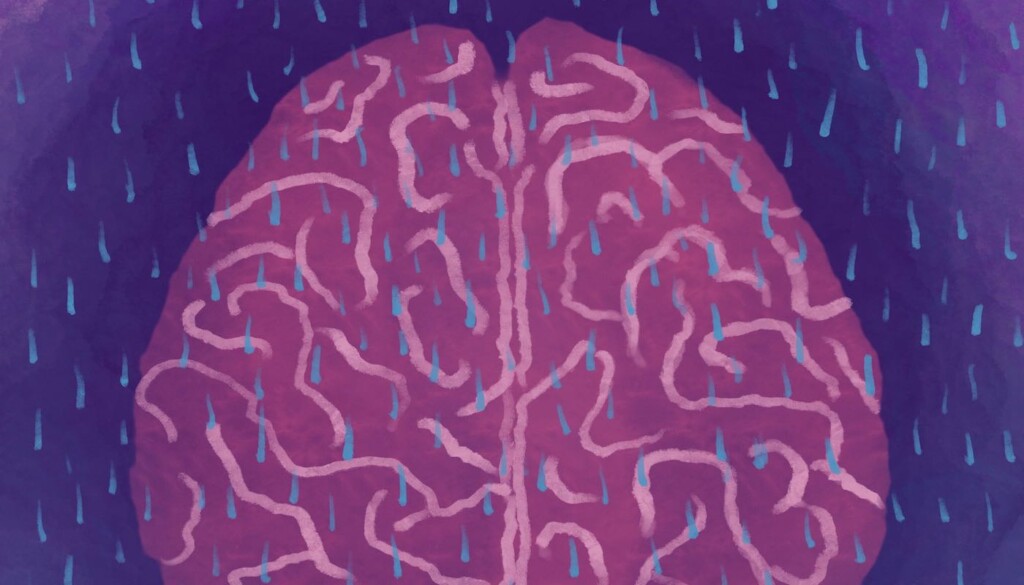

A good night’s sleep clears your mind, new research suggests, like turning on a dishwasher before bed and waking up with a clean brain.
The international team of scientists describes the process as the elimination of waste that accumulates in the brain during waking hours.
Their findings also offer insight into how sleeping pills may disrupt the “brainwashing” system, potentially affecting long-term cognitive function.
Researchers already know that the brain has a built-in waste removal process called the “glymphatic system,” which circulates fluid through the brain and spinal cord to eliminate it.
The process helps remove toxic proteins that form sticky plaques linked to neurological disorders, such as Alzheimer’s disease, but what drives the system has remained unclear until now.
Danish scientists from the University of Copenhagen have discovered that a molecule called norepinephrine plays a key role in brain cleansing in mice.
During deep sleep, the brainstem releases tiny waves of norepinephrine about every 50 seconds.
The study’s lead author, Professor Maiken Nedergaard of the University of Rochester in New York, explained that norepinephrine triggers blood vessels to contract, generating slow pulsations that create a rhythmic flow in the surrounding fluid to evacuate waste.
She said: “It’s like turning on the dishwasher before you go to bed and waking up with a clean brain.
“We’re basically wondering what drives this process and trying to define restorative sleep based on glymphatic clearance.”
To find clues, she and her team studied what happens in mice when the brain sleeps. They focused on the relationship between norepinephrine and blood flow during periods of deep sleep.
They found that norepinephrine waves correlated with changes in cerebral blood volume, suggesting that norepinephrine triggers a rhythmic pulsation in blood vessels.
The researchers then compared changes in blood volume to brain fluid flow, finding that fluctuations in brain fluid flow correspond to changes in blood volume. The vessels act as pumps to propel surrounding brain fluid to remove waste.
“You can think of norepinephrine as the conductor of an orchestra,” explained the study’s lead author, Dr. Natalie Hauglund, of the University of Copenhagen and the University of Oxford.
“There is harmony in the constriction and dilation of the arteries, which then drive cerebrospinal fluid through the brain to remove waste.”
Dr. Hauglund then wanted to know if all sleep was equal.
To find out, the research team gave zolpidem, a common drug to aid sleep, to mice.
They found that norepinephrine waves during deep sleep were 50% lower in zolpidem-treated mice than in naturally sleeping mice. Although the zolpidem-treated mice fell asleep more quickly, fluid transport to the brain dropped by more than 30%.
SMART SLEEP: Brain matter may remain higher in people who like to nap
Researchers say their conclusions published in the review Cell show that sleeping pills likely disrupt the elimination of waste caused by norepinephrine during sleep – and the results probably also apply to humans, since they also have a glymphatic system.
Scientists have observed similar norepinephrine waves, blood flow patterns, and brain fluid flow in humans.
“More and more people are using sleeping pills, and it’s really important to know if this constitutes healthy sleep. » Hauglund said in a press release. “If people are not enjoying the full benefits of sleep, they need to be aware so they can make informed decisions.”
Their findings could also provide insight into how poor sleep may contribute to neurological disorders such as Alzheimer’s disease.
“Now that we know that norepinephrine is involved in brain cleansing, we can figure out how to give people long, restful sleep,” Professor Nedergaard concluded.
SLEEP AID ALERT: Share the latest data with your friends on social networks…






